Lotus-eaters
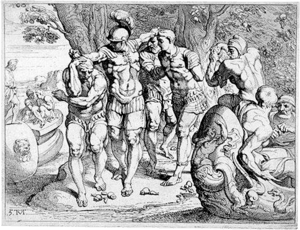
In Greek mythology the lotus-eaters (Greek: λωτοφάγοι, lōtophagoi), also referred to as the lotophagi or lotophaguses (singular lotophagus /ləˈtɒfəɡəs/) or lotophages (singular lotophage /ˈloʊtəfeɪdʒ/), were a race of people living on an island dominated by lotus plants. The lotus fruits and flowers were the primary food of the island and were a narcotic, causing the inhabitants to sleep in peaceful apathy.
Mythology
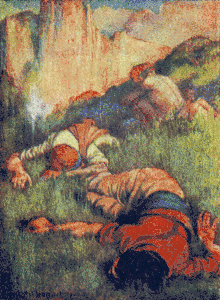
In the Odyssey Book IX, Odysseus tells how adverse north winds blew him and his men off course as they were rounding Cape Malea, the southernmost tip of the Peloponnesus, headed westwards for Ithaca:
I was driven thence by foul winds for a space of 9 days upon the sea, but on the tenth day we reached the land of the Lotus-eaters, who live on a food that comes from a kind of flower. Here we landed to take in fresh water, and our crews got their mid-day meal on the shore near the ships. When they had eaten and drunk I sent two of my company to see what manner of men the people of the place might be, and they had a third man under them. They started at once, and went about among the Lotus-eaters, who did them no hurt, but gave them to eat of the lotus, which was so delicious that those who ate of it left off caring about home, and did not even want to go back and say what had happened to them, but were for staying and munching lotus with the Lotus-eaters without thinking further of their return; nevertheless, though they wept bitterly I forced them back to the ships and made them fast under the benches. Then I told the rest to go on board at once, lest any of them should taste of the lotus and leave off wanting to get home, so they took their places and smote the grey sea with their oars.[1]
Location
Herodotus, in the fifth century BC, was sure that the lotus-eaters still existed in his day, in coastal Libya:
A promontory jutting out into the sea from the country of the Gindanes is inhabited by the lotus-eaters, who live entirely on the fruit of the lotus-tree. The lotus fruit is about the size of the lentisk berry and in sweetness resembles the date.[2] The lotus-eaters even succeed in obtaining from it a sort of wine.[3]
Polybius identifies the land of the lotus-eaters as the island of Djerba (ancient Meninx), off the coast of Tunisia. Later this identification is supported by Strabo.[4]
Lotus plant
Because the Greek word lôtos can refer to several different plants, there is some ambiguity as to which "lotus" appears in the Odyssey. Some of the proposed species, based in part on Herodotus' assertion, include:
- a fodder plant such as a species of Trifolium, Melilot or Trigonella, the Lotus corniculatus, the fellbloom, or Medicago arborea
- the sweet and succulent persimmon fruit of the date-plum Diospyros lotus
- a water-lily, either Nymphaea lotus, Nymphaea caerulea, or Nymphaea stellata. Recent studies have shown that the blue water-lily of the Nile, Nymphaea caerulea, also known as the blue lotus (already known under this name to the Greeks), is another candidate. It can be processed to be used as a soporific and, in some formulations, has psychotropic properties. It is common in Egyptian iconography which suggests its use in a religious context.
- the nettle-tree, Celtis australis
- Ziziphus lotus, a relative of the jujube
It is the last of these, or another member of the genus Ziziphus, that is traditionally taken to be the plant meant in the Odyssey.[5]
Alternatives could be: i) The Loquat Eriotrya japonica, (Pronounced 'Luo gwat' in Cantonese), is a native of China, Himachal Pradesh Province of India and northern Pakistan. (Aithiops or “Ethiopian,” a Greek concoction meaning “sunburnt face,”, so perhaps The 'Ethiopians' means the 'Indians 'rather than the Africans). The Loquat is a mild sedative, because the leaves and pips contain cyanogenic glycosides that have a sedative effect lasting 24 hours, but presumably could be fatal in high dosages . ii) The apricot,Prunus armeniaca,."Apricot kernels pose risk of cyanide poisoning" (European Food Safety Authority. 27 April 2016). The Greek word “lotus” means 'the fruit that brings oblivion to those who eat it'. Perhaps suggestive of the dangers of over-eating loquats or apricots.
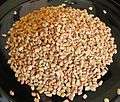 Fenugreek seeds.
Fenugreek seeds.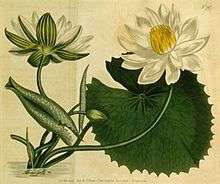
.jpg)
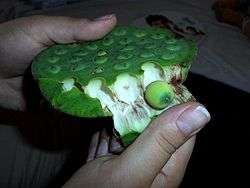 Nelumbo nucifera seeds.
Nelumbo nucifera seeds.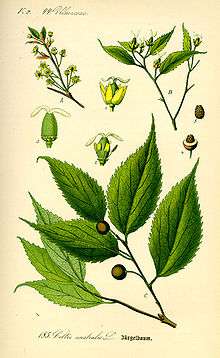
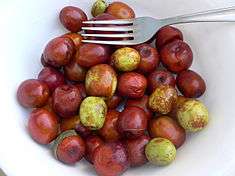 Fresh jujube fruits.
Fresh jujube fruits.
 Diospyros lotus "date-plums"
Diospyros lotus "date-plums"
Notes
- ↑ Odyssey IX, translated by Samuel Butler.
- ↑ In A.D. Godley's translation "mastich-berry".
- ↑ Herodotus, Histories, iv.177 (on-line text).
- ↑ Strabo 1.2.17.
- ↑ lôtos at Liddell, Scott, A Greek-English Lexicon, 1889.